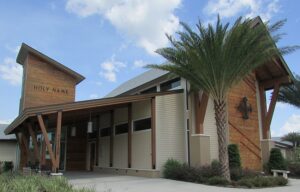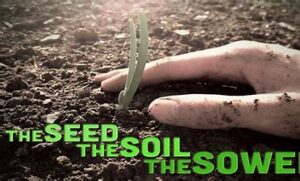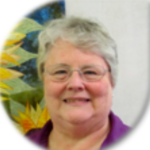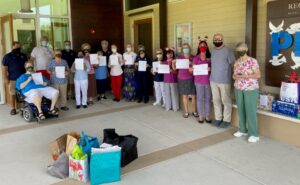Benedictine Sisters of Florida – Concert Update
Monthly Concerts Update

Continue ReadingIf tonight God came in your dream and told you to ask for one thing and one thing only, what would you ask for?

The opening lines of this Gospel selection seem to me a good description of what we did. Many years ago our predecessors recognized a treasure across the street – a piece of land with a stunning view and a perpetual breeze, awesome sunrises, and sunsets. They buried it with a citrus grove –went out with joy to serve the people of God in many places. And, when the time was right…our time. We sold what we had and came back with joy to reclaim our treasured “pearl.”
Jesus asks us: Do you understand all these things?” Like the disciples we without hesitation answer, “Yes.” But, maybe our voices quiver and there’s a question mark in our expression; but, there is conviction in our hearts that we will extend God’s kingdom wherever we live, whatever the restrictions we struggle with, whatever the types of resources we have at hand.
The Gospel reading concludes with a curious statement about the scribe who understands the kingdom of heaven. How do we identify and describe God’s Kingdom here on earth? One way that immediately comes to mind is this morning with the outpouring of love and concern evident in the “Christmas in July” celebration provided by the St. Mark’s Knights of Columbus and the Columbiettes. God bless them!
The Kingdom of God was always clear to Jesus but to us it will always be somewhat mysterious. As we are formed in the mind of Jesus – and identify with His mindset – His vision becomes ever clearer to us. We pray: “May the mind of Christ my Savior live in me from day to day; may His word dwell richly and Jesus’ love fill me that I may be calm and strong and brave.” (Hymn: “Mind of Christ” by Katie Wilkinson).
In everyday terms, as who we live here in east Pasco County Florida, tomorrow, next week, in our transition into and out of COVID times – our mission, our vision will not change. The words of a Quaker hymn come to mind: “We bend and we bow and shan’t be ashamed.” Our mission remains the same – it just takes on a new shape. Why did our Sisters come from PA to settle in this area? “Was it not to feed the education hunger of the local children? Long before we wrote formalized philosophy statements and directional goals, our Sisters “fed hungers” in a variety of roles at all levels in the education field. They worked in internal ministries and as nurses and home-care takers, seamstresses, coif makers, packing house workers, gardeners, … you name it, as long as it was legal and moral, someone probably tried it. Our aim is, and has always been, to foster life in community – to BE community for each other: to pray and work; to interact with the care and respect St. Benedict describes in his Rule, particularly in RB chapter 72. “be the first to show respect to the other.” Or in our own words: to be the first “to respond with the compassion of Christ to the hungers of others.”
In a world that seems to have gone insane: refusing to recognize the signs of spread of disease, climate changes, and global hunger – sane things seem to be unreal. Jesus presents to us a variety of examples to help us conceptualize His Kingdom: a hidden treasure, a box filled with golden coins buried somewhere in a field; the Kingdom as a precious pearl, a jewel found by a businessman who astutely sold everything he owned in order to buy it; a fishing net filled with fish both good and bad, wheat and chaff growing together. The illustrations abound: leaven in dough, light, salt, a seed, a ripe harvest, a pearl (was it still hidden deep in the oyster’s grasp?), a royal feast and a wedding banquet.
These parables all have to do with a person finding something of such tremendous value that they are willing to give up everything they have in order to possess it.
If tonight God came in your dream and told you to ask for one thing and one thing only, what would you ask for? Is the kingdom of God so important to you that you are prepared to part with all you have in order to have it?
God leads the way – sets the path before us … God is the merchant who gives up all in order to possess a treasure – He gave His only Son, and in doing so, He has identified US as His pearl of great price.
~Reflection by Sister Roberta Bailey, OSB, Prioress
First Reading 1 Kings 3:5,7-12 Second Reading Romans 8:28-30
Gospel Matthew 13:44-52 (shorter form: Matthew 13:44-46)
Continue ReadingA proud father and son…
Better than a Biscuit
 I invite you to consider, as you do lectio with this Gospel: Which am I? Am I the sower, the seed, the soil or a plain old weed? Or perhaps it would be better to ask: when am I like a weed needling others or jabbing them like a thorn? When have I been the sower of good seed? How have I been the seed that blossomed in another? And, please, God, may I always be good soil, receptive to the good seed you freely scattered all around me… often right at my feet in the rhythm of my day. May my ears be attentive to your voice, my eyes only take in the good and my voice be an instrument to further Your kingdom.
I invite you to consider, as you do lectio with this Gospel: Which am I? Am I the sower, the seed, the soil or a plain old weed? Or perhaps it would be better to ask: when am I like a weed needling others or jabbing them like a thorn? When have I been the sower of good seed? How have I been the seed that blossomed in another? And, please, God, may I always be good soil, receptive to the good seed you freely scattered all around me… often right at my feet in the rhythm of my day. May my ears be attentive to your voice, my eyes only take in the good and my voice be an instrument to further Your kingdom.
In Jesus’ story the sower spreads good seed in the field expecting a healthy wheat harvest. But in the dark of night an enemy comes and sows weeds in among the wheat. So when the seedlings begin to sprout the workers in the field see that something is amiss. Those are not all wheat plants – what are they? How’d they get there?
A little knowledge of botany will help us. Matthew uses a Greek word for a botanical term that can be interpreted: wild rice grasses, or cockles. Maybe in Florida it would remind us “sandspurs” – those icky, prickery round blooms – hard-to-get off with bare hands. [A tip: wet your fingers before you try to grab hold of a sandspur.] The difference between the wheat and cockles is evident only when the plants mature and the ears begin to appear. With real wheat the ears will be so heavy they droop. Cockle, on the other hand, has ears that stand up straight.
Now, when the field hands call this to the owner’s attention they are advised: “Let them grow up together until the harvest.” That reminded me of the expression “accept the thorns among the roses” or “You gotta take a little bad along with the good.” Intrigued, and with a little time to spare, I checked what Google could turn up. This next one, Google said, only a born and bred Vermonter would say: “just because a cat has her kittens in the oven don’t make them biscuits.”
That reminded me of story that was related to me recently by a pastor-farmer-friend who had visited in a nearby town. Before the days of COVID, he’d accepted an invitation to join the ministerial breakfast meeting. It being March 16, and the feast of St. Isadore the farmer, they’d called upon a local pastor who was a member of one of Florida’s oldest ranching families to offer the invocation and meal blessing.
He was decked out in his typical attire: bib overalls, a baggy denim shirt, grasping a floppy straw hat. “Please bow your heads as we ask God’s blessing,” he began and then waited for his table companion to clear his voice. (Or, was he stifling a laugh?) Our prayer leader went on: in a strong, reverent voice:
“Lord, you know I hate buttermilk”. My friend opened one eye to peek at the farmer and wondered where this was going.
The farmer loudly proclaimed, “And, Lord, I hate lard.” Now my pastor-friend was growing concerned – wondered if those who knew him realized their friend was losing it. Without missing a beat, the farmer continued, “And Lord, you know I don’t much care for raw white flour.”
My friend again opened an eye, but this time to glance around at everyone seated with him at table. He realized that he wasn’t the only one beginning to feel uncomfortable. The Pastor-Farmer just went right on: “But Lord, when you mix them all together and bake them, I do love those warm fresh biscuits.”
He realized that he wasn’t the only one beginning to feel uncomfortable. The Pastor-Farmer just went right on: “But Lord, when you mix them all together and bake them, I do love those warm fresh biscuits.”
He paused a second, lifted a hand, raised his eyes, and with a beatific smile, prayed on …”So Lord, when things come up that we don’t like, when life gets hard, when we don’t understand what you’re saying to us, help us to just relax and wait until you are done mixing. It will probably be even better than biscuits.” AMEN
~Reflection by Sister Roberta Bailey, OSB, Prioress
Wisdom 12-13, 16-19 Romans 8:26-27 Matthew 13:24-30
Continue Reading
Reflection from Federation of St. Scholastica
Today’s reflection is by
Sister Glenna Smith, OSB
of the Benedictine Sisters of Virginia
If you would like to sign up to receive alerts when a new reflection from Sister Glenna Smith is posted and help spread the word of the Federation of St. Scholastica Centennial Celebration 1922-2022,
please click here: scholastica-celebration.org.
16th Sunday in Ordinary Time
July 19
Matthew 13:24-43 OR 13:24-30
 Again, Jesus says, “Whoever has ears ought to hear.” This, once again, suggests that we need to be open and receptive to the Word. There are some ordinary, simple things outlined in today’s Gospel: the farmer is to sow good seed, the leavening power of yeast mixed with flour, the mustard seed. These metaphors may help us to begin to perceive Jesus’ meanings.
Again, Jesus says, “Whoever has ears ought to hear.” This, once again, suggests that we need to be open and receptive to the Word. There are some ordinary, simple things outlined in today’s Gospel: the farmer is to sow good seed, the leavening power of yeast mixed with flour, the mustard seed. These metaphors may help us to begin to perceive Jesus’ meanings.
Some of Mother Teresa’s words ring in my ears and heart:
- Be faithful in small things because it is in them that your strength lies.
- Peace begins with a smile.
- Kind words can be short and easy to speak, but their echoes are truly endless.
- If you judge people, you have no time to love them.
- I have found the paradox that if I love until it hurts, then there is no hurt, but only more love.
- Let us always meet each other with a smile, for the smile is the beginning of love.
I offer a sample of my own pondering that comes from the Rule of Benedict, Scripture, and others (Facebook, musicals, psychology, Star Trek, etc.):
- Be the first to show respect…bear with the greatest patience one another’s weaknesses of body or behavior.
- Let there be no grumbling whatsoever.
- See Christ in everyone (Namaste)
- You will never look into the eyes of anyone God does not love.
- Gossip does not bear good fruit.
- The good of the many outweighs the good of the one.
- To have loved another person is to have seen the face of God.
- Maturity moves us from an external locus of control to an internal locus of control. (equivalent or parallel to conscience development?)
- Don’t let the sun go down on your anger.
Enormous sacrifices are asked of some of Jesus followers. Others of us are asked to do seemingly smaller, perhaps less noteworthy, things to build or strengthen the Body of Christ. What are you called to today?
 Sister Glenna Smith entered the Benedictine Sisters of Virginia in 1977 and has served her community and their ministries for 40+ years as teacher, prefect, camp director, counselor, principal and administrator, school psychologist, member of various boards, formation director, monastery coordinator, and subprioress. She was privileged to serve the Federation of Saint Scholastica as president from 2010-2014.
Sister Glenna Smith entered the Benedictine Sisters of Virginia in 1977 and has served her community and their ministries for 40+ years as teacher, prefect, camp director, counselor, principal and administrator, school psychologist, member of various boards, formation director, monastery coordinator, and subprioress. She was privileged to serve the Federation of Saint Scholastica as president from 2010-2014.





